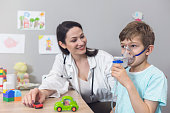Treating Asthma Children

If the family has a history of asthma, the chances are of high risk. If one parent has asthma, the chances of the child developing is double but if both parents have, then the chances are 4 times higher. It is also shown that asthma is more common among boys than girls.
Occasionally, the symptoms happen for no obvious reason, but there can be certain triggers that can set asthma off or make it worse. These can be due to infections such as colds, dust, smoke, fumes and chemicals, allergic reaction, medicines, animals, house dust mites or certain foods and exercise.
In critical cases, the symptoms may deteriorate rapidly, the ability to speak and breathe may become difficult, the pulse may quicken and the lips may turn blue. Also the skin around the chest and neck may tighten as the child tries to breathe. The child may even complain of chest pains, as the muscles have to work promptly to maintain enough air.
If an asthma attack occurs, immediately give your child their reliever treatment. Ensure they are sitting upright and not laying down and make the child to relax. If they still feel uncomfortable, call the doctor or ambulance and meantime continue with their reliever and help in whatever way you can.
If you suspect that your child has asthma, it is best to contact your doctor for advice. Your doctor may carry out some tests, so make sure you furnish him with your child’s medical history such as the child’s symptoms and that may have set off the symptoms.
Depending on your child’s age, a device called a peak flow meter may be used to assist in the detecting asthma. A peak flow meter measures the volume and how quickly air can be breathed out from your child’s lungs. This device can also be used to check if a treatment is effective.
A spirometry (spirometer – a measuring instrument for measuring the vital capacity of the lungs) is another device that can help to determine how well your child’s lungs are functioning and can give more information than the peak flow meter. Sometimes a doctor may call for an x-ray to see if there is another cause.
A skin test may be carried out to see if your child is allergic to certain substances. If your child is under five, asthma may be diagnosed if your child responds to asthma treatments.
There is no cure for asthma but you can only manage it, There are two range of treatments, one is to relief symptom and the other is to prevent future symptoms that can be used to manage it.
Various factors are involved in asthma, so each treatment will be individual to the child and will combine medicines and the appropriate management that will work best for your child.
Inhalers are a small aerosol can that propels the correct dose of medication and relaxes the muscles around the airways allowing the child to breathe easier. In older kids this is done by pressing down on the device while in younger children a powder is used. It is important that he or she is able to use the inhalers properly to be effective.
There are two basic types of inhaler medicines that are used for asthma that is short-acting so called relievers to avoid symptoms from arising and another is longer-lasting termed as preventers that help if the symptoms appear.
In some severe cases, the attacks are treated with steroid tablets administered over a period of time. If your child is under five years old and has asthma that is difficult to control they should be referred to a specialist.
Identifying things that either trigger it off or make it worse is an essential element in the overall treatment strategy. Keeping some sort of journal that can record anything that may start off your child’s asthma can assist your doctor to discover a pattern with the appropriate treatments for your child.
Regular use of the flow meter that your doctor provide you with will help in identifying if an attack is imminent. Frequent low readings as well as insomnia because of coughing and wheezing and staying away from school or social activities often may help in relieving the condition,
The older your child is, he or she will be more intelligent and understand the importance of his or her own asthma management. With proper and sufficient measures and proper treatments most children can lead a normal and healthy life. Remember medical treatments can only be part of the treatment.
Comments
Post a Comment